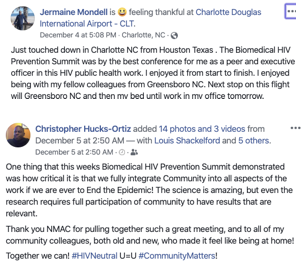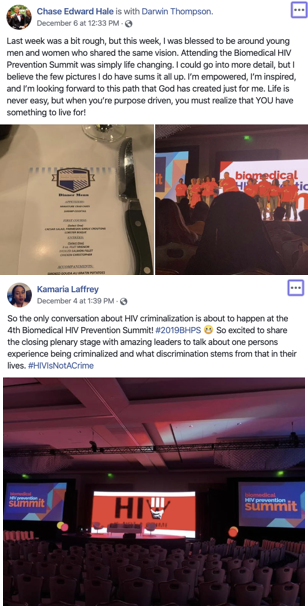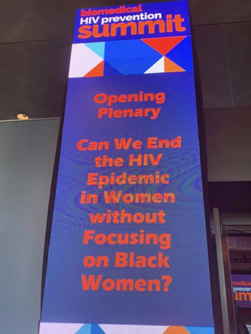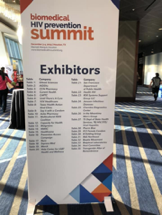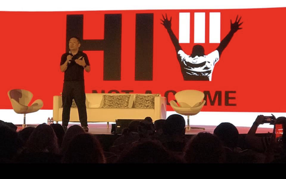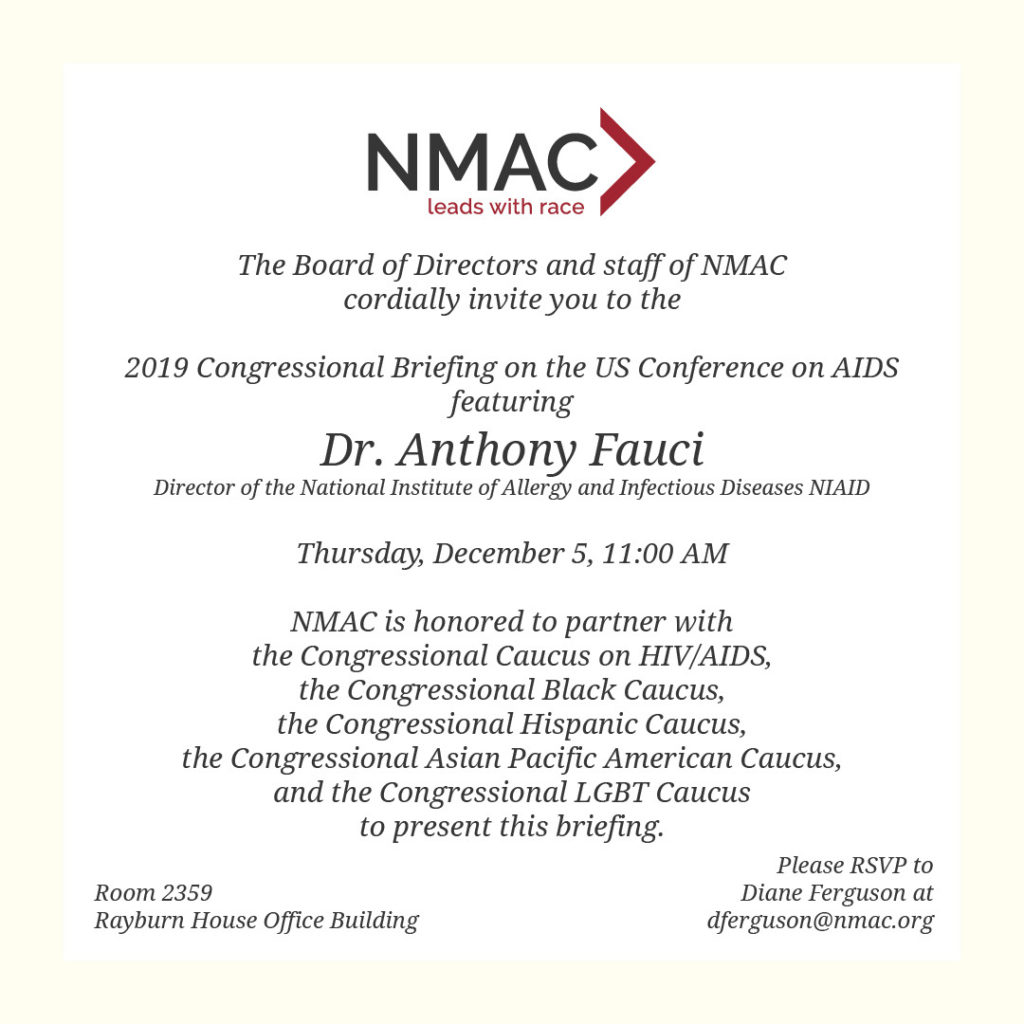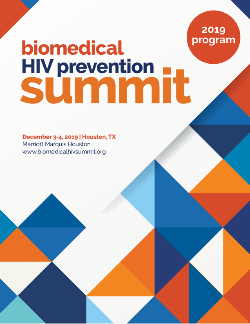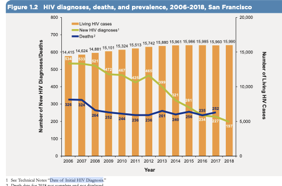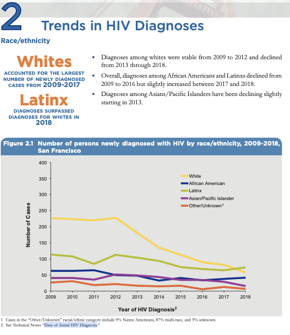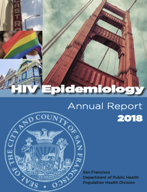| Last week’s Biomedical HIV Prevention Summit saw big numbers. When the final count is done it will be more than 1,400 people. We are particularly grateful to the Houston Host Committee. They made this meeting one for the record books. Here is some of the feedback we received:
Since the opening was about women, we also wanted to have a memorial moment to remember all the transgender women who were murdered this year. Violence, like HIV, is an epidemic in the transgender community. This session was put together by transgender women who wanted to give names to the souls that were lost and the intersection of HIV, violence, employment, housing, and the healthcare needs of the transgender community. The Summit is committed to addressing the difficult issues that face our work. NMAC is committed to the authentic voices of community.
NMAC wants to thank all of our sponsors and exhibitors:
We are moving the next Summit to the spring of 2021 because currently it is too close to the United States Conference on AIDS and both meetings had big attendance this year. We need more time between meetings to ensure we are able to produce the best possible trainings. Since USCA is delayed to October of 2020 (end of hurricane season), we felt this would be a good time to push the Biomedical HIV Prevention Summit to the spring of 2021. Look for more information on this in the spring of 2020. And a reminder: the 2020 USCA will take place October 10-13 at the Puerto Rico Convention Center in San Juan. We have a new domain – usconferenceonaids.org. All 2020 USCA forms will be available when we officially launch the conference website on Feb. 3, 2020. Registration, abstracts, exhibits, hotel, and scholarship information will be posted at that time. Yours in the struggle, |
HIV 50+ Internships and Sponsorships Awarded
Congratulations to this year’s HIV 50+ Internships and Sponsorships Recipients!
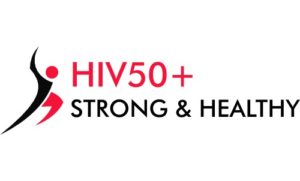 HIV 50+ Advocacy Internship: The Advocates Internship project is a new addition to the HIV 50+ Strong and Healthy Program. This internship is for those scholars looking to engage and participate in a structured effort to advocate on behalf the HIV 50+ population. NMAC awarded 12 internships for advocates to form the steering committee that will conceptualize and spearhead the creation of the National HIV 50+ Advocates Network. Scholars will attend AIDS Watch 2020 in Washington, D.C., a two-day meeting to form the National HIV 50+ Advocates Network and participate in the Federal AIDS Policy Partnership.
HIV 50+ Advocacy Internship: The Advocates Internship project is a new addition to the HIV 50+ Strong and Healthy Program. This internship is for those scholars looking to engage and participate in a structured effort to advocate on behalf the HIV 50+ population. NMAC awarded 12 internships for advocates to form the steering committee that will conceptualize and spearhead the creation of the National HIV 50+ Advocates Network. Scholars will attend AIDS Watch 2020 in Washington, D.C., a two-day meeting to form the National HIV 50+ Advocates Network and participate in the Federal AIDS Policy Partnership.
Recipients:
- Cecilia Dennis-Phoenix, AZ
- Jeffery Edwards-Knight-Charlotte, NC
- Jeffery Haskins-Philadelphia, PA
- Kenneth Johnson-Dallas, TX
- Nadine Ruff-New Haven, CT
- Nancy Duncan-Valley Stream, NY
- Patricia Kelly-Orangeburg, SC
- Porchia Dees-Los Angeles, SC
- Robert Riester-Denver, CO
- Stephen Adonna-Orlando, FL
- Steven Vargas-Houston, TX
- Thomas Villa-Rockville, MD
HIV 50+ Sponsorship: This year NMAC awarded 21 sponsorships to three selected meetings/conferences on HIV and aging. Sponsorships provide a platform for scholars to advocate, learn and represent the HIV 50+ community
Recipients:
The 10th International Workshop on HIV and Aging-New York, NY
- William Hall-Seattle, WA
- Dawn Breedon-Fort Myers, FL
- Reggie Dunbar II-Atlanta, GA
- Nancy Duncan-Valley Stream, NY
2019 Biomedical HIV Prevention Summit-Houston, TX
- Trevor Bradley-Indianapolis, IN
- Art Jackson-Indianapolis, IN
The International Conference on AIDS 2020
- Kneeshe Parkinson-Arnold, MO
- Janice Shirley-Charlotte, NC
- Michael Smith-Sante Fe, NM
- Rob Ingwerson- Portland, OR
- Alan Timothy Lunceford-Stevens-
- Nicky Calma-San Francisco, CA
- Jared Hafen- Salt Lake City, UT
- Porchia Dees- Los Angeles, CA
- Esther Ross-Greenville, NC
- Denise Drayton-Brooklyn, NY
- Carlos Carmona- San Antonio, TX
- Diana Goodie-Greenville, NC
- Zeke Garcia- San Antonio, TX
- Rob Pompa- Allentown, PA
- Josef Pons-Puerto Rico
HIV 50+ Mini-Grants Awarded
Congratulations to this year’s HIV 50+ Mini-grant Recipients!
 This year we awarded 11 mini-grants to Scholars to implement programs/projects in their communities related to HIV and aging. These Mini-grants focus on education, advocacy and empowerment among the HIV 50+ population. These Mini-grants will run from December 2019-May 2020. Below are the recipients:
This year we awarded 11 mini-grants to Scholars to implement programs/projects in their communities related to HIV and aging. These Mini-grants focus on education, advocacy and empowerment among the HIV 50+ population. These Mini-grants will run from December 2019-May 2020. Below are the recipients:
- Angel Hernandez – Arecibo, Puerto Rico
Project Title: Celebrating Advocacy for 50+ Moving Forward Together
Description: This program is targeted to 50+ persons living with HIV and their allies, with a full day framed in a Christmas Celebration in an open space where they will educate on HIV and Aging advocacy awareness beginning with self-advocacy on healthcare, promoting healthy habits with physical activities of aqua aerobics, zumba and goofy games which also promotes good mental health. - Art Jackson – Indianapolis, IN
Project Title: B-FIT
Description: The objective of the photo and social media campaign will be to highlight 12 members of the 50+ members of the community who have made amazing strides in changing the trajectory of HIV/AIDS in their community by becoming actively engaged in reducing stigma, bias, fear and barriers to care. This unique approach will allow these 12 ambassadors to offer perspectives from a large population whose voices are not shared. - Bryan Jones – Cleveland, OH
Project Title: The Sankofa Initiative…Living Long and Strong with HIV
Description: This project will develop a short 10-15 minute video that will highlight four people 50 and over living with HIV. Each one will address a specific issue and provide insight into overcoming the issue, including acceptance, stigma, isolation, and disclosure. The creative vehicle used to move the video along will be a phone call between a newly diagnosed person and several long-term survivors. - Dawn Breedon – Fort Myers, FL
Project Title: HIV 50+ Peer to Peer Dine and Learn
Description: The purpose of these sessions are to educate individuals 50 plus living with HIV about the latest information on U=U, Sexual Health, Living healthy with other illnesses, aging with HIV making money without losing Social Security benefits and socializing within the community. - Emilio Aponte-Sierraparetti – Palm Beach, FL
Project Title: AMIGAS: Empowering Hispanic Women Living with HIV 50+
Description: AMIGAS was created as a safe space for Hispanic women living with HIV. AMIGAS is a Spanish acronyms where each letter have its own meaning. The meaning of the letter “A” is “Amistad” (Friendship). “M” means “Motivación” (Motivation), “I” means “Integridad” (Integrity), “G” means “Generosidad” (Generosity), “A” means “Amor” (Love), and “S” means “Sabiduría” (wisdom). This group has been a source of support for women who are newly diagnosed with HIV and in shock for the diagnosis or women that have been living with HIV for a while and suffering because the HIV stigma. - Esther Ross – Greenville, NC
Project Title: LAMPS: Leaders Advocating Mentoring Personal Growth and Support
Description: The LAMPS Project aim is to impact the lives of underrepresented/marginalized People of Color Living with HIV (POCLWH) 50 years and older population. Empowering Women Living with HIV (WLWH) 50 years and older to see themselves as Human beings worthy of dignity, respect and of equal value is an unchallengeable method to reduce internal and external stigma. - David “Jax” Kelly – Cathedral City, CA
Project Title: Striving to Thrive Town Hall
Description: Striving to Thrive will be a town hall format featuring panels of speakers from the local Ryan White planning board (Riverside County), government agencies (ADAP, HOPWA, etc.), Featured discussion to include planning and implementing a ‘Standards of Care” document for people living with HIV over 50 to be used by planning bodies, clinics and community based organizations. The town hall will be scheduled for late March or Early April 2020. - Kneeshe Parkinson – Arnold, MO
Project Title: Level Up-Women and Men FORUM/Healthy and Strong
Description: To enhance, educate and empower the lives of those HIV 50+ diagnosed with HIV/AIDS to eradicate STIGMA and improve quality of life with a meaningful impact. In addition the program goals are to increase the knowledge for ally’s from the community and have meaningful involvement to help our fast track city initiatives efforts. FORUM – is a place, meeting or medium where ideas and views on a particular issue can be exchanged. - Miguel Delgado-Ramos – Cidra, Puerto Rico
Project Title: Taking my Life to Another Level”- The “LleVaN”Project
Description: The purpose of the “Taking my Life to Another Level” Project is to improve quality of life of HIV + persons, mainly HIV 50+ in terms of how to take their life to another level through self-reflection, self-help and self-empowerment by addressing the six dimensions of wellbeing model as proposed by the National Wellness Institute and promoted by SAMHSA. - Nancy Shearer – Santa Monica, CA
Project Title: Intergenerational Buddy Support Program: Celebrating a Lifetime of Resiliency
Description: The purpose of this project is to develop a program of intergenerational mentorship between older adults living with HIV and younger adults aged living with HIV. The project’s purpose was informed by two overarching goals: (1) to provide an opportunity for social engagement for older adults living with HIV, thus addressing the psychological and physiological threats of loneliness and isolation, and (2) to expose younger HIV-positive individuals to meaningful mentorship, allowing for the destigmitization of HIV as a general concept and discussions centered around resiliency, education, and prevention through safe practices with partners. - Robert Cornelius – Chattanooga, TN
Project Title: Survivors Network
Description: The goal of this project is to connect individuals who identify as both, aging and have an HIV/AIDS diagnosis, with the education and resources needed to learn valuable life skills. The information will help them continue to grow into the successful survivors that they are! We hope that with this information, it will empower and encourage the population to serve and encourage the younger generation with peer support and history of the virus
This World AIDS Day NMAC will Host Two Events
|
This World AIDS Day NMAC will Host Two Events
|
Remembering Transwomen Lost
This year, 22 transwomen of color have been murdered in the United States. Enough is enough!!! The growing violence against transwomen of color is a serious concern that we must address collectively as a community. We can no longer watch on the sidelines, year after year, as the number of transwomen of color victimized by violence continues to increase.
The Transgender, Gender Non-confirming, and Non-binary (TGNCB) Constituent Advisory Panel in partnership with NMAC and the Trans Latina Coalition will hold a memorial during the Biomedical Prevention HIV Prevention Summit this year in Houston, TX. The memorial will honor and remember the transgender women of color who have been murdered this year as well as our other transgender family members who perished too soon.
 If you are attending the Biomedical Summit this year, we invite you to participate in our memorial. As part of honoring those we have lost, we will erect an altar of remembrance that will remain on display throughout the Summit. Altars of remembrance derive from the Mexican tradition known as Day of the Dead, or Dias De Los Muertos, where loved ones remember those they have lost by placing photos, candles, and other items on an altar that reminds them of their loved ones. If you have lost transgender people in your personal life, we invite you to bring item(s) to the Biomedical Summit. We ask that you only bring an item(s) to the altar that you do not wish to keep.
If you are attending the Biomedical Summit this year, we invite you to participate in our memorial. As part of honoring those we have lost, we will erect an altar of remembrance that will remain on display throughout the Summit. Altars of remembrance derive from the Mexican tradition known as Day of the Dead, or Dias De Los Muertos, where loved ones remember those they have lost by placing photos, candles, and other items on an altar that reminds them of their loved ones. If you have lost transgender people in your personal life, we invite you to bring item(s) to the Biomedical Summit. We ask that you only bring an item(s) to the altar that you do not wish to keep.
NMAC’s ultimate goal is to erect a standing altar that we can add to annually and possibly take on tour in the future!
We know that an altar will not bring back those we have lost or ease the pain of grief; however, we hope this memorial truly serves as a vehicle to honor and remember our loved ones. We also hope this altar will serve as a visual reminder of the danger trans people face on different fronts, and the work we still need to do to address the challenges that threaten the life expectancy of trans people across the country.
The Transgender Altar of Remembrance will be located in the exhibit hall through the duration of the Summit. For more information, contact us at conferences@nmac.org.
Yours in the Struggle,
The TGNCB Constituent Advisory Panel
What’s Happening in San Francisco?
|
|
|
|
Youth Initiative Update
By Charles Shazor, Associate Program Manager
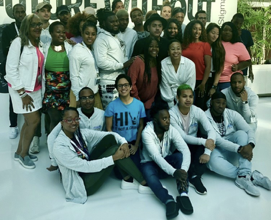 NMAC’s Youth Initiative is in high gear as our Youth Scholars prepare to implement their World AIDS Day projects. We are excited to announce that NMAC has recently approved each Youth Scholar’s application for a mini grant of $500 to assist them with their World AIDS Day project budgets. This mini grant award is a key investment to NMAC’s Youth Scholars as a “thank you” for their hard work and commitment to providing education and awareness in regard to the various stigmas surrounding people of color living with HIV in America.
NMAC’s Youth Initiative is in high gear as our Youth Scholars prepare to implement their World AIDS Day projects. We are excited to announce that NMAC has recently approved each Youth Scholar’s application for a mini grant of $500 to assist them with their World AIDS Day project budgets. This mini grant award is a key investment to NMAC’s Youth Scholars as a “thank you” for their hard work and commitment to providing education and awareness in regard to the various stigmas surrounding people of color living with HIV in America.
The Youth Scholars have been paired with a Youth Initiative Council member to serve as a mentor through the on-site training, planning, and implementation of their World AIDS Day projects. The Youth Initiative Council is composed of five (5) seasoned Youth Scholars from previous years of Youth Initiative programming who 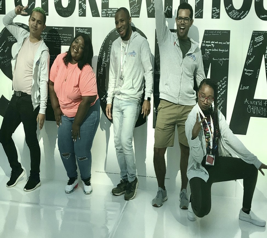 have shown exceptional leadership and advocacy in their respected HIV communities. We strongly believe that this method of mentorship not only assists our new Youth Scholars to effectively complete their World AIDS Day projects, but also continues to build the skills and leadership of our Youth Initiative Council as an additional investment in their futures.
have shown exceptional leadership and advocacy in their respected HIV communities. We strongly believe that this method of mentorship not only assists our new Youth Scholars to effectively complete their World AIDS Day projects, but also continues to build the skills and leadership of our Youth Initiative Council as an additional investment in their futures.
With a little over a month remaining before World AIDS Day (December 1), NMAC’s Youth Scholars and Youth Initiative Council are working tirelessly to bring their World AIDS Day projects to life. Together, NMAC’s Youth Scholars and Youth Initiative Council will present key concerns and challenges in creating a shared vision to identify meaningful solutions in the HIV epidemic.
Youth Initiative 2019 USCA Experience
The Youth Initiative Youth Scholars had the opportunity to participate in a three day in-person training to prepare them for their World AIDS Day community projects. The in-person training was conducted through closed sessions during the 2019 USCA in Washington, DC. During this time the Youth Initiative Scholars were given key tools and learned the skills needed through mentorship, informational sessions, peer to peer education, and intergenerational leadership to partner with local HIV organizations. The Youth Scholars will use the skills that they learned during the 2019 USCA to design an HIV-related project for World AIDS Day (December 1). With the assistance of NMAC staff and the Youth Initiative Council, the implementation of their projects will be based on the Youth Scholars’ interests in HIV care and/or prevention that has the greatest impact in their hometown and social media networks.
YI Scholar Quotes from 2019 USCA
What Did You Like about USCA?
“Meeting the other Youth Scholars and being able to experience seeing a powerful protest. It was definitely an eye opener connecting with the others and being able to feel the comfort of being comfortable in your own skin.”
“What I like most about USCA, is that everyone around me is open and it’s comfortable about being who they are and what they went through and took me in like family. I loved how much I have learned. USCA gave me a stronger voice.”
“I loved the bonding and interactions that were made. NMAC afforded us a great opportunity of exposure to so much and I left with great connections and future partnerships.”
“The opportunity to get to meet so many inspiring young leaders from around the country and getting the chance to become inspired in so many ways.”
“I really was able to enjoy hearing and being able to take in other people’s stories. Being able to hear people like me made me feel like I wasn’t alone anymore. Like other people understood me and I definitely needed that.”
Hot Asian Guys
 Here is the infamous PrEP ad that was rejected by Instagram. Created by APICHA (Asian Pacific Islander Coalition on HIV/AIDS) Community Health Center. According to Instagram, the ad was rejected on the grounds that APICHA “hadn’t been authorized to run ads about social issues, elections or politics.”
Here is the infamous PrEP ad that was rejected by Instagram. Created by APICHA (Asian Pacific Islander Coalition on HIV/AIDS) Community Health Center. According to Instagram, the ad was rejected on the grounds that APICHA “hadn’t been authorized to run ads about social issues, elections or politics.”
While there was lots of press about why Instagram, a subsidiary of Facebook, would cancel the ads, what got lost in the discussions were the hot Asian guys. For the record, Therese Rodriguez is the leader of APICHA and a long term NMAC board member.
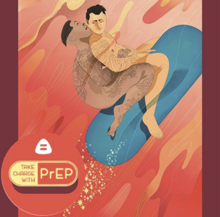 PrEP education campaigns, even ones that are rejected by Instagram, will be key components of our initial efforts to end the epidemic. Jurisdictions will be asked to significantly increase the knowledge and acceptability of PrEP in communities that are hardest hit by HIV, especially communities that have not seen the benefit of the science.
PrEP education campaigns, even ones that are rejected by Instagram, will be key components of our initial efforts to end the epidemic. Jurisdictions will be asked to significantly increase the knowledge and acceptability of PrEP in communities that are hardest hit by HIV, especially communities that have not seen the benefit of the science.
What makes a good campaign?
- Messenger is as important as the message
- Culturally relevant
- Speaks to the values of the recipient
- Nonjudgmental
- Sex positive
There are not lots of PrEP campaigns that target Asian and Pacific Islander gay men. As a result, this campaign stands out because the images speak to a very specific community. However, it is not a matter of just substituting the photos. Unfortunately, it is much more complex.
Who Should Local Jurisdictions Target For PrEP Programs?
The federal plan hopes to enroll 900,000 more people on PrEP. Basically, that means everyone it can reach; however, jurisdictions will need to prioritize where to expend resources. Health centers, FQHCs, STD clinics and private doctors should target everyone. STD clinics are particularly important because people who get STDs should prioritized for PrEP education.
Federal funds for PrEP education and outreach needs to reach the communities that are hardest hit by HIV but have not yet received the benefit of PrEP. These communities should be determined by the community viral load for zip codes in the jurisdictions. The zip codes with the highest community viral load need to be triaged and prioritized for PrEP and U=U programs. Science, particularly epidemiology, needs to be the determining factor for what communities are prioritized.
This is where the fight starts…
Can we at least agree that not everyone needs to be equally prioritized to use PrEP? Programs should target people who are sexually active in a “sex positive” manner. Jurisdictions will hopefully prioritize zip codes with the highest community viral load. However, not all the people in that zip code are the same. How should jurisdictions determine who to prioritize? Follow the science and prioritize communities with the highest viral load, particularly those communities that have not seen the benefit of PrEP.
What does this mean in practice? Some PrEP programs need to target everyone who is sexually active or injects drugs. Other programs need to prioritize the communities that are highly impacted by HIV but have not seen the benefits of the science. Metrics for successful PrEP programs must be finalized, particularly programs that can reach thousands, if not tens of thousands of people. The federal plan hopes to get 900,000 more people on PrEP. To reach those numbers, programs will need to expand in ways that are still to be determined. In the past Ryan White programs were able to meet the increased demand by retooling the service delivery model. Can HIV care, treatment and prevention systems retool to accommodate 500,00 more people living with HIV and 900,000 more people on PrEP?
None of this is easy. That is why I was happy looking at hot Asian guys. Thank you APICHA for making me smile. I salute your important work!
Yours in the struggle,
End the Epidemic among Young People
National Library of Medicine & NMAC Youth Navigator Program
Submitted by Terrell Parker
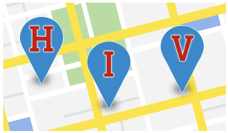 As our constituents move closer to developing their ending the epidemic plans, NMAC is committed to ensuring we prioritize groups and communities currently experiencing the heaviest burden of new HIV transmissions and those who despite advances in HIV treatment are not reaching viral suppression. One group we must prioritize and center in our ending the epidemic efforts is our youth population.
As our constituents move closer to developing their ending the epidemic plans, NMAC is committed to ensuring we prioritize groups and communities currently experiencing the heaviest burden of new HIV transmissions and those who despite advances in HIV treatment are not reaching viral suppression. One group we must prioritize and center in our ending the epidemic efforts is our youth population.
NMAC is proud to continue its Youth Navigation Program, in collaboration with the National Library of Medicine (NLM). The project will continue to engage HIV navigators who tailor their services for youth populations (13-24) and provide tailored HIV/AIDS information resources, tools, and technical assistance and training. During this project, NMAC will work with its existing youth focused Advisory Board to build upon lessons learned to further work to eradicate HIV amongst youth.
Why Do the Youth Navigators Matter?
The Youth Navigation Program is based on the concept that people in communities trained as HIV navigators can be affective at eliminating barriers to the timely prevention of HIV as well as helping people living with HIV reach viral suppression. According to the CDC “In 2017, youth aged 13 to 24a made up 21% (8,164) of the 38,739 new HIV diagnoses in the United States and dependent areas. Youth with HIV are the least likely of any age group to be timely linked to care and have a suppressed viral load.” Also, the CDC’s recently released 2018 Sexually Transmitted Disease Surveillance Report found that rates of reported gonorrhea and chlamydia were highest among teens and young adults. As new HIV/STI transmission rates for youth are at an all-time high, effective youth navigation is needed now more than ever. We must increase our efforts to prevent HIV among youth.
Meaningfully Involved Community
The Youth Navigation Program will continue to engage HIV navigators who tailor their services to the youth populations (13-24), develop tailored HIV/AIDS information resources and tools, and provide training and technical assistance on NLM and other reputable HIV/AIDS resources to navigate youth through the health care management spectrum of HIV/AIDS.
Through this partnership, The New ERA: YNP will accomplish the following:
- Understand barriers and provide the resources and tools for HIV Navigators that serve the youth on HIV prevention, treatment and the value of research;
- Improve self-efficacy and health literacy by youth and HIV navigators on obtaining quality, accurate and authoritative HIV/AIDS information resources;
- Increase the knowledge, skills, awareness and use of NLM HIV/AIDS Resources (AIDSinfo®/AIDSource) for HIV navigators;
- Refine the branding campaign to further promote “The New ERA of HIV: Youth Navigation Program;” and
- Develop and disseminate training materials in three areas; Navigator and Peer education, Youth Client Outreach, and PrEP Adherence and develop a Youth Navigation Toolkit as well.
What’s Next?
We understand that youth face compounding issues making it more difficult to access prevention and care services. Training and development for navigators will be pivotal to ending the HIV epidemic among young people. Addressing HIV in youth requires that we give young people the information and tools they need to reduce their risk, make healthy decisions, and get treatment and care if needed. Disparities in access to accurate HIV/AIDS information, misconceptions, and concerns around stigma among youth require NLM to respond to the changing HIV/AIDS environment – changes in both the demographics of the epidemic, as well as in technology.
Additional information on the 2020 Youth Navigation Program Advisory Board Consortium will be forth coming! As we look to the future of health with a person-driven model of care, it is even more critical for health information to be precise and tailored for those who need it most.
This is Where the Fight Starts
 NMAC urgently fights for racial justice and health equity. Health equity means everyone has access to quality healthcare and the medications needed to live long healthy and happy lives. Healthcare is a right and not a privilege. Justice is about prioritizing those communities with the greatest need. The opening plenary for the 2019 Biomedical HIV Prevention Summit will ask the question, “Can We End the HIV Epidemic in Women, Particularly Black Women?” There was some push back to that announcement: “What about Latinas? What about all women? Why only hold out Black Women?” The fact is that Black women account for 60% of all the women living with HIV in the United States. This question highlights the racial justice struggle to end the HIV epidemic. NMAC fights for equal access to HIV services and meds for all women, and we want justice for Black women. The burden of the HIV epidemic on Black women calls out for justice.
NMAC urgently fights for racial justice and health equity. Health equity means everyone has access to quality healthcare and the medications needed to live long healthy and happy lives. Healthcare is a right and not a privilege. Justice is about prioritizing those communities with the greatest need. The opening plenary for the 2019 Biomedical HIV Prevention Summit will ask the question, “Can We End the HIV Epidemic in Women, Particularly Black Women?” There was some push back to that announcement: “What about Latinas? What about all women? Why only hold out Black Women?” The fact is that Black women account for 60% of all the women living with HIV in the United States. This question highlights the racial justice struggle to end the HIV epidemic. NMAC fights for equal access to HIV services and meds for all women, and we want justice for Black women. The burden of the HIV epidemic on Black women calls out for justice.
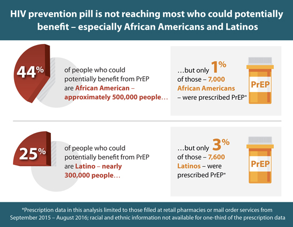 NMAC wants everyone to have access to PrEP. When 75% of the people on PrEP are white, it becomes an issue of racial justice. PrEP programs that reach highly-impacted communities of color must come from and be culturally responsive to those communities. Unfortunately, it is not just a matter of switching white faces for people of color. PrEP programs that reach highly-impacted communities of color must come from and be culturally responsive to those communities.
NMAC wants everyone to have access to PrEP. When 75% of the people on PrEP are white, it becomes an issue of racial justice. PrEP programs that reach highly-impacted communities of color must come from and be culturally responsive to those communities. Unfortunately, it is not just a matter of switching white faces for people of color. PrEP programs that reach highly-impacted communities of color must come from and be culturally responsive to those communities.
We also need to talk about justice for the transgender community. As long as the CDC continues to classify transgender men and women with gay men, we will never end the HIV epidemic in the  transgender community. How can you end what you do not know? If we don’t know the number of transgender men and women living with HIV, how will this initiative know it is successful? NMAC questions the scientific accuracy of CDC’s HIV epidemiological profiles because of this long-held practice. At its core, this is not good public health practice and something that the CDC can and should change.
transgender community. How can you end what you do not know? If we don’t know the number of transgender men and women living with HIV, how will this initiative know it is successful? NMAC questions the scientific accuracy of CDC’s HIV epidemiological profiles because of this long-held practice. At its core, this is not good public health practice and something that the CDC can and should change.
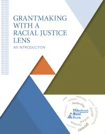 HIV funding must address equity and justice. NMAC believes that all communities should have the resources needed to end the HIV epidemic; however, as a matter of justice, we believe the resources need to prioritize the communities that are hardest hit by HIV. In the United States, gay men share the largest burden of HIV. As the federal government looks to target resources geographically, HIV prevention and care efforts need to target the communities with the greatest burden of HIV: Black/Latinx/American Indian gay men, Black cisgender heterosexual women, people of transgender experience, and drug users. Funding priorities need to follow the epidemiological profile of that jurisdiction.
HIV funding must address equity and justice. NMAC believes that all communities should have the resources needed to end the HIV epidemic; however, as a matter of justice, we believe the resources need to prioritize the communities that are hardest hit by HIV. In the United States, gay men share the largest burden of HIV. As the federal government looks to target resources geographically, HIV prevention and care efforts need to target the communities with the greatest burden of HIV: Black/Latinx/American Indian gay men, Black cisgender heterosexual women, people of transgender experience, and drug users. Funding priorities need to follow the epidemiological profile of that jurisdiction.
This is where the fight starts.
We are all hopeful and thankful for new resources, but will the money get to the organizations that can reach the communities hardest hit by HIV? NMAC hopes the G-57 jurisdictions will put out requests for funding that speaks to community and their strengths. Too often awards are won by organizations who can afford expensive grant writers, but could never reach the most affected subpopulations. NMAC will work with the G-57 to identify best practices that support community responses.
Agencies and health departments that implement new programs should be required to hire people from the communities that effort hopes to reach. If you want to reach the transgender community, then you need to hire transgender people. If you want to reach black women, then you need to hire black women. If you want to reach drug users, then you need to hire people with experience using drugs. If you want to reach people over 50 living with HIV, then you need to hire people over 50 living with HIV.
While this might seem self-evident, you would be surprised how often it does not happen. Now is the time to take a census of who works at the health department, community health center or community-based organization. Does staff reflect, represent, and have senior staff from the communities the work needs to reach? NMAC does not mean to imply that you need to get rid of anyone but, when there are new hires, who gets the job? Now is the time to correct any past challenges and build a work force that can speak the communities this effort needs to reach.
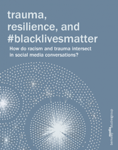 Our work to end the epidemic must be viewed through a racial justice and health equity lens. It is more than retention in care and adherence to meds. It’s retention in care and adherence to meds in the communities that are hardest hit by HIV. NMAC will fight to ensure that all communities have access to the health care and the medications needed to live long healthy and happy lives. We will also fight for justice to make sure that the communities hardest hit by HIV are prioritized. The color of your skin should never be a determining factor for who acqires HIV or any other disease. In the words of the late Congressmen Elijah Cummings, “we are better than this!”
Our work to end the epidemic must be viewed through a racial justice and health equity lens. It is more than retention in care and adherence to meds. It’s retention in care and adherence to meds in the communities that are hardest hit by HIV. NMAC will fight to ensure that all communities have access to the health care and the medications needed to live long healthy and happy lives. We will also fight for justice to make sure that the communities hardest hit by HIV are prioritized. The color of your skin should never be a determining factor for who acqires HIV or any other disease. In the words of the late Congressmen Elijah Cummings, “we are better than this!”
Yours in the struggle,
Paul Kawata
30 Years of Service


